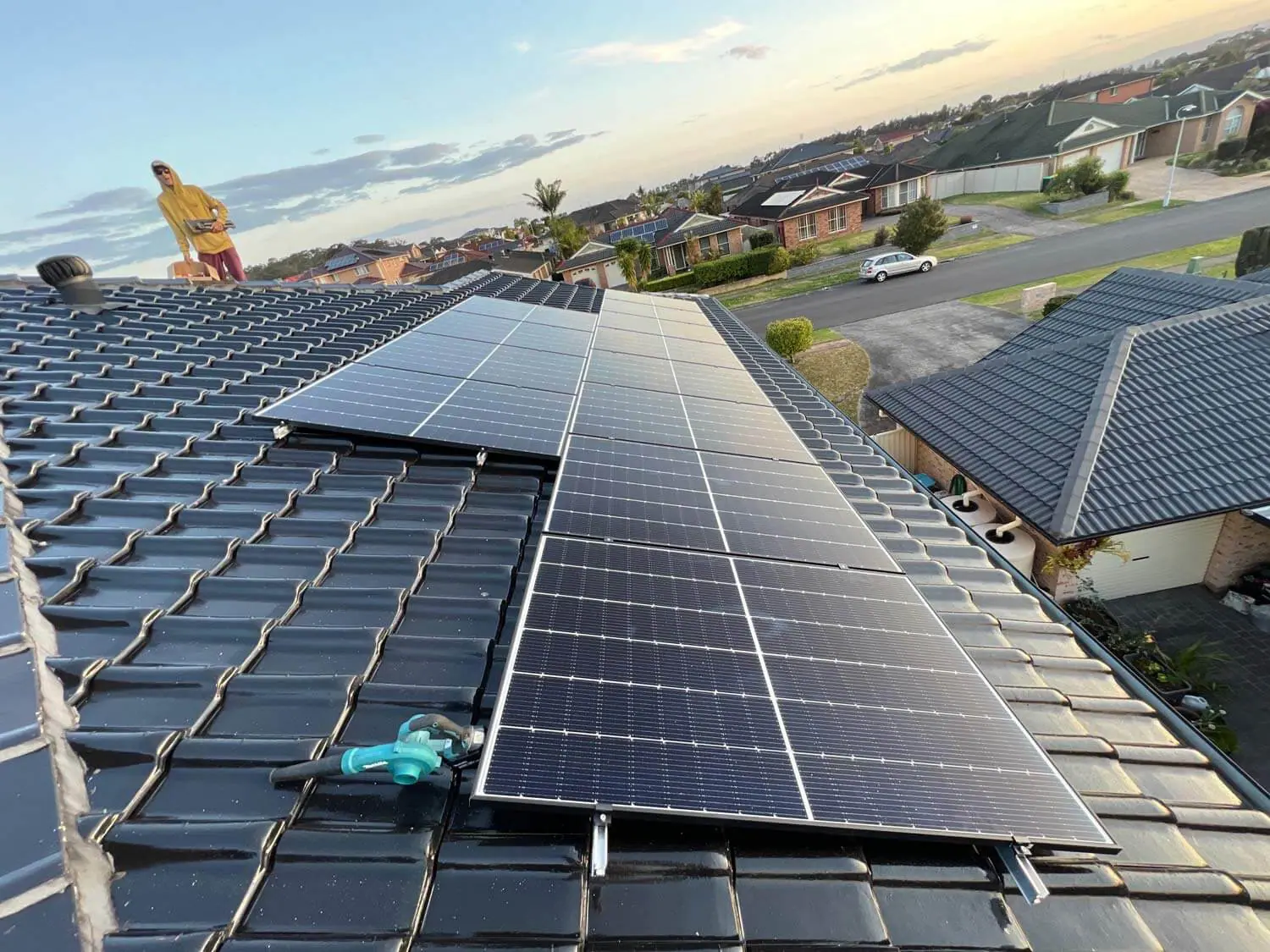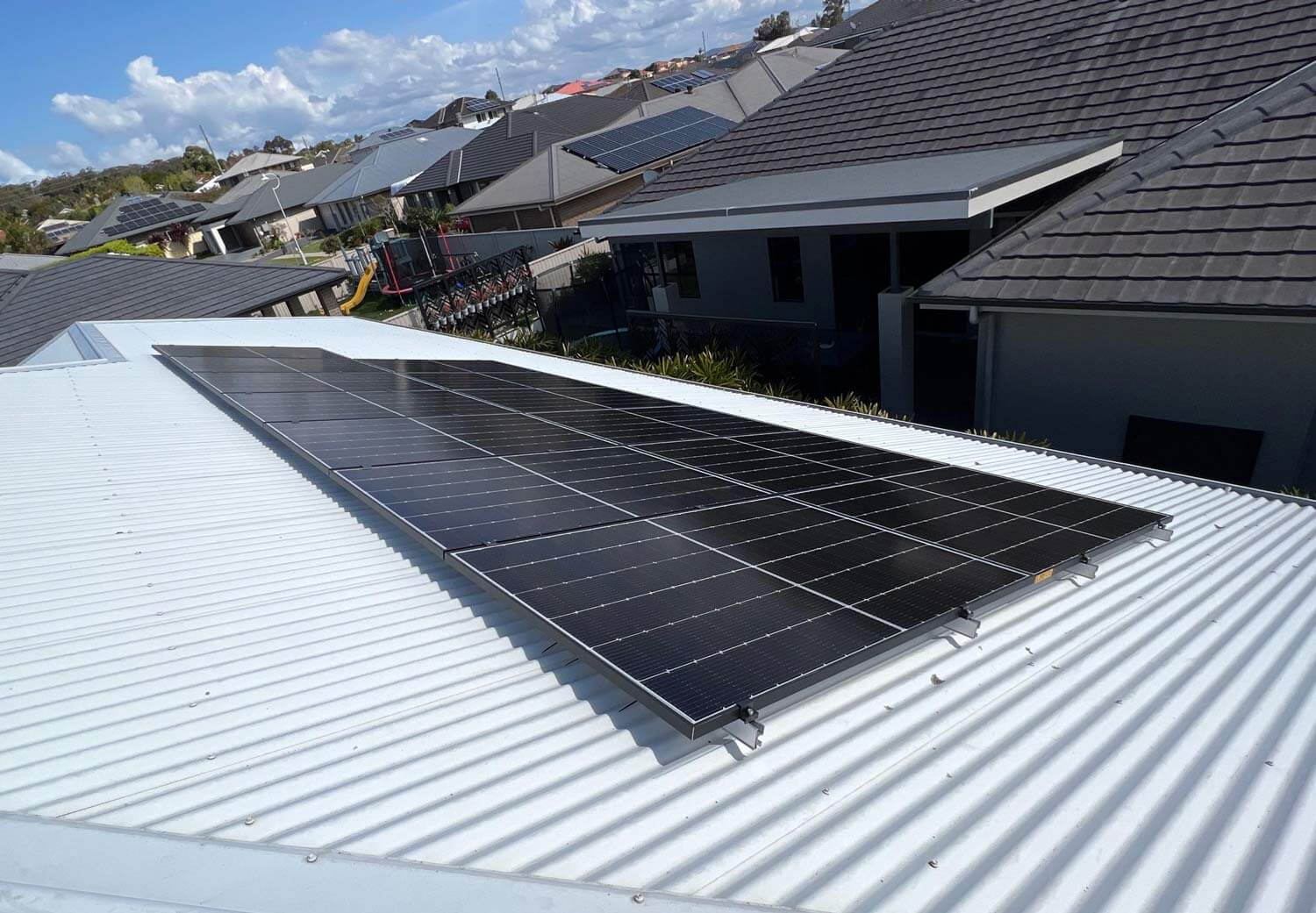Home Cost 5kW Solar System 5kW Solar System With Battery Price
5kW Solar System With Battery Price
A 5 kW solar panel system can generate about 20-30 kWh of electricity daily. For this configuration, you’ll need a backup battery with a capacity of 14 kWh.
Installing a 5 kW solar system with battery backup will cost between $17,500 and $23,500 on average.
In this article, we will provide you with a detailed review of the 5kWh solar system with battery price. We will also highlight the popular battery systems you can consider installing alongside your solar system.
Table of Contents
ToggleHow much does a 5kW solar system cost?
On average, a 5 kW solar system costs approximately $6,034, installed. The cost ranges between $5,719 and $6,309. This cost is inclusive of the solar rebate.
The Australian government’s rebate amount depends on the STC zone you live in. Australia is divided into 4 STC zones based on the level of solar radiation and other factors. Let’s find out how much a 5 kW solar system will cost in each zone.
| STC zone | STC rating | 5kW solar system cost (installed) |
|---|---|---|
| 1 | 1.622 | $5,719 |
| 2 | 1.536 | $5,837 |
| 3 | 1.382 | $6,034 |
| 4 | 1.185 | $6,309 |
5kW Solar System price with battery backup
Installing your 5 kW solar system with a battery system will help you store the excess solar energy generated during the day for use later at night or on overcast days when your solar system isn’t producing enough power.
Let’s find out how many batteries you need for your 5 kW solar system and the overall installation cost.

What battery size would be ideal for a 5kW solar system?
A 5 kW solar system typically generates about 20–30 kWh of electricity daily. A solar battery with a capacity of 14 kWh would be ideal for this solar system.
Depending on the type of battery you choose, you may need one or more batteries to reach the required capacity of 14 kWh. We recommend the Tesla Powerwall 2 battery system, which has a 13.5/14 kWh capacity, as you will only need one battery for your 5 kW solar system. The SonnenBatterie Eco is also a good option.
We will discuss more battery types below.
How much does a 14 kWh battery system cost?
On average, a 14 kWh battery system costs between $12,500 to $16,000. The actual cost will depend on the type and brand of the battery. For instance, the 14 kWh Tesla Powerwall 2 battery costs approximately $1,000 per kWh, with an overall cost of $14,000.

So, how much will a 5kW solar system plus battery cost?
Installing a 5 kW solar system with a battery backup (a Tesla Powerwall 2 battery in this case) will set you back by approximately $19,655.
This cost may vary depending on the type and quality of solar panels and batteries you choose. Cheaper panels and batteries will be much cheaper to install.
Average solar battery storage price in Australia (fully installed)
On average, solar batteries cost between $668 and $2,240 per kWh. However, the exact cost varies depending on your preferred brand, battery type, and capacity.
The following table displays the average battery installation prices, GST included.
| Battery size (kWh) | Battery only cost | Battery cost + inverter/charger |
|---|---|---|
| 3kWh | $4,260 | $4,770 |
| 8kWh | $10,080 | $11,120 |
| 13kWh | $16,380 | $17,680 |
| 18kWh | $23,940 | $25,920 |
Popular solar battery systems in Australia plus price
Below are the most popular battery systems, plus their costs.
| Battery | Capacity | Average cost | Cost per kilowatt | Type | Warranty |
|---|---|---|---|---|---|
| Tesla Powerwall 2 | 14 kWh | $14,000 | $1,000 | Lithium ion | 10 years |
| sonnenBatterie Eco | 14 kWh | $15,000 | $1,071 | Lithium ion | 10 years |
| Sungrow-Samsung sbp4k8 | 4.8 kWh | $4,610 | $962 | Lithium ion | 10 years |
| Redflow Zcell | 10 kWh | $12,600 | $1,260 | Zinc-bromine | 10 years |
| Enphase Energy | 1.2 kWh | $2,057.00 | $1,714 | Lithium ion | 10 years |
| ZEN Energy | 10kWh to 20kWh | $10,000 to $15,000 | $1,000 | Lithium ion | 10 years |
| AKASOL’s neeoQube | 5.5 kWh | $12,000 | $2,143 | Lithium ion | 10 years |
| Sunverge SIS | 11.6kWh | $26,000 | $2,229 | Lithium ion | |
| Alpha Ess | 11 kWh | $7,302 | $668 | Lithium ion | 10 years |
| LG | 9.8 kWh | $8,195 | $837 | Lithium ion | 10 years |
What is the best solar battery storage type to install?
There are many brands of solar batteries on the market, but they are divided into 3 broad categories:
- Lithium-ion batteries
- Lead-acid batteries
- Saltwater batteries
The type and brand of battery system you choose will depend on your budget and preferences. Of the three types named above, lithium-ion battery systems are the most efficient as they have a larger storage capacity and a longer life span. However, they are quite expensive.
If you are looking for cheaper options, lead-acid and saltwater batteries are good options.
Is it worth getting battery storage with solar?
Yes. Adding a battery backup system to your solar system allows you to use more of the electricity you generate. Solar batteries help you store the surplus energy your solar system generates for use later in the day, at night, during power outages, and on overcast days.
With solar batteries, you will reduce the amount of electricity you draw from the grid when your panels are not generating energy. Therefore, your overall electric bill will be significantly low.
Factors affecting the cost of solar systems with battery storage
There are several factors that can affect the cost of solar systems with battery storage. They include:
- Battery capacity. The capacity of a battery system is the biggest consideration when it comes to battery costs. The larger the battery capacity, the more power it stores and the more expensive it is. The size of the solar battery you buy will depend on the size of your solar system.
- DC vs. AC batteries. Direct current (DC) batteries have a less complex build, which makes them more affordable than alternating current (AC) batteries. Although DC batteries are cheap, they are not as versatile and flexible as their AC counterparts. Furthermore, DC batteries may not be compatible with your solar system.
- Battery type. The composition of the battery also affects its overall cost. For example, lithium-ion-phosphate batteries are more efficient and hence more expensive than lead-acid batteries. Also, nickel-manganese (NMC) batteries, a type of lithium-ion battery, are cheaper than LFP batteries. Lead-acid batteries have a lower capacity and lifespan, which makes them more affordable.
- Number of batteries. The more batteries you need, the higher the cost. Typically, the number of batteries you need will depend on their storage capacity and the number of appliances you want to run.
- Incentives and rebates. Battery storage systems are pretty expensive, and their lifespan is shorter than that of solar panels. Luckily, you may get rebates and incentives from your local or state government to lower the upfront installation cost. However, not all states provide battery rebates, and the amount you get will differ from one state to another. You can also get solar rebates from the federal government to lower the initial cost of installing solar panels.
- Adding a battery to an existing solar system. Typically, it costs more to retrofit an existing solar system than to install it simultaneously with a battery system.
Do I need a battery backup system?
Installing solar batteries has many benefits, including a reduced electric bill and staying powered during power outages. Whether you need a battery system will depend on your needs and preferences.
Let’s find out the pros and cons of installing solar batteries.
Pros and cons of storing solar power in batteries
Pros of solar batteries
- Reduced power bills. Batteries allow you to store the excess power your solar system produces during peak demand periods. This helps reduce electric bills.
- Increased energy independence. Generating and storing your own energy makes you energy independent, especially during power blackouts or emergencies.
- Reduce your carbon footprint. Renewable energy systems like solar panels and batteries reduce dependence on fossil-fuel-generated power. This reduces negative environmental impacts and contributes to a cleaner, greener, and more sustainable future.
- You can go off-grid. If you want to live entirely off the grid, installing a battery backup system is the way to go. However, off-grid systems are too expensive to be considered by the average homeowner.
Cons of solar batteries
- High upfront costs. Battery storage systems are quite expensive. The cost can increase significantly, especially if you are also installing solar panels.
- Increased maintenance requirements. Solar batteries require frequent maintenance to maintain optimal performance and increase their lifespan. You will also need to replace them when needed and periodically monitor your solar system to ensure it is working properly.
- Limited capacity. Battery backup systems have a limited capacity; hence, you may need several batteries depending on the size of your solar system. Larger battery systems may be more expensive to install and may not be cost-effective.
- Lifespan. Solar batteries have a shorter lifespan compared to solar panels. This means you may need to replace your batteries after 5 to 15 years, depending on their composition.
FAQ's
A 14 kWh battery has a high storage capacity and can last between 14 and 18 hours in blackout conditions. The battery will drain quickly if you run heavy-duty appliances like air conditioners and washers and dryers.
Under proper care and maintenance, the battery can serve you for about 10 to 15 years before it needs replacing. This means you will need to replace our battery system at least once or twice during the lifespan of your solar panel system, which is usually 25 to 30 years.
Yes. AC batteries are flexible and can be compatible with any solar PV system so they can be retrofitted to your solar system. You may however need an inverter system for the batteries and extra solar panels for maximum power generation.
An average Australian homeowner can save anywhere between $100 and $1,000 per year with a battery backup system, depending on the size of the battery and consumption habits.
An unsubsidised battery system can take around 10 to 20 years to fully pay for itself, depending on its capacity, size, and type. Subsidised battery systems can pay for themselves sooner.
Although some homeowners may have the skills to install solar panels and battery systems, it is not recommended to DIY the installations due to safety concerns. These systems should be installed by licensed and accredited electricians in accordance with Australian standards.
Compare Solar Panel Quotes
Table of Contents
Toggle









